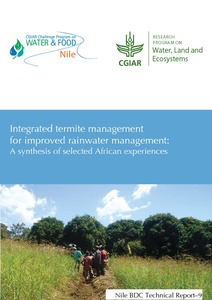Resource information
In eastern Africa, termites are perceived by farmers, livestock keepers, and many development agencies as serious agricultural pests that destroy pasture, crops and wooden infrastructure. Commonly use control measures have proven to be ineffective. When the CGIAR Challenge Program on Water and Food (CPWF) undertook research aimed at increasing agricultural water productivity in eastern Africa, termites destroyed early experiments designed to rehabilitate degraded land and increase water productivity. Building on indigenous knowledge from termite affected regions of Ethiopia, the CPWF and Uganda partners initiated research on integrated termite management. Results were promising. This literature review was commissioned to capture the state-of-knowledge about termite taxonomy, and diversity, farmers’ ethno-ecological knowledge of subterranean termites and termite management practices and control measures used in African crop and rangeland production systems. The paper offers some general lessons and guidelines for future agricultural research and development programs where termite damage is problematic. In brief, we conclude that ITM offers greater prospects for enabling termites to play important positive roles in agro-ecosystem functioning while reducing the damage they inflict on crop and livestock production.



